Thomas James Richards, Diaries, Transcript Vol. 2 - Part 31
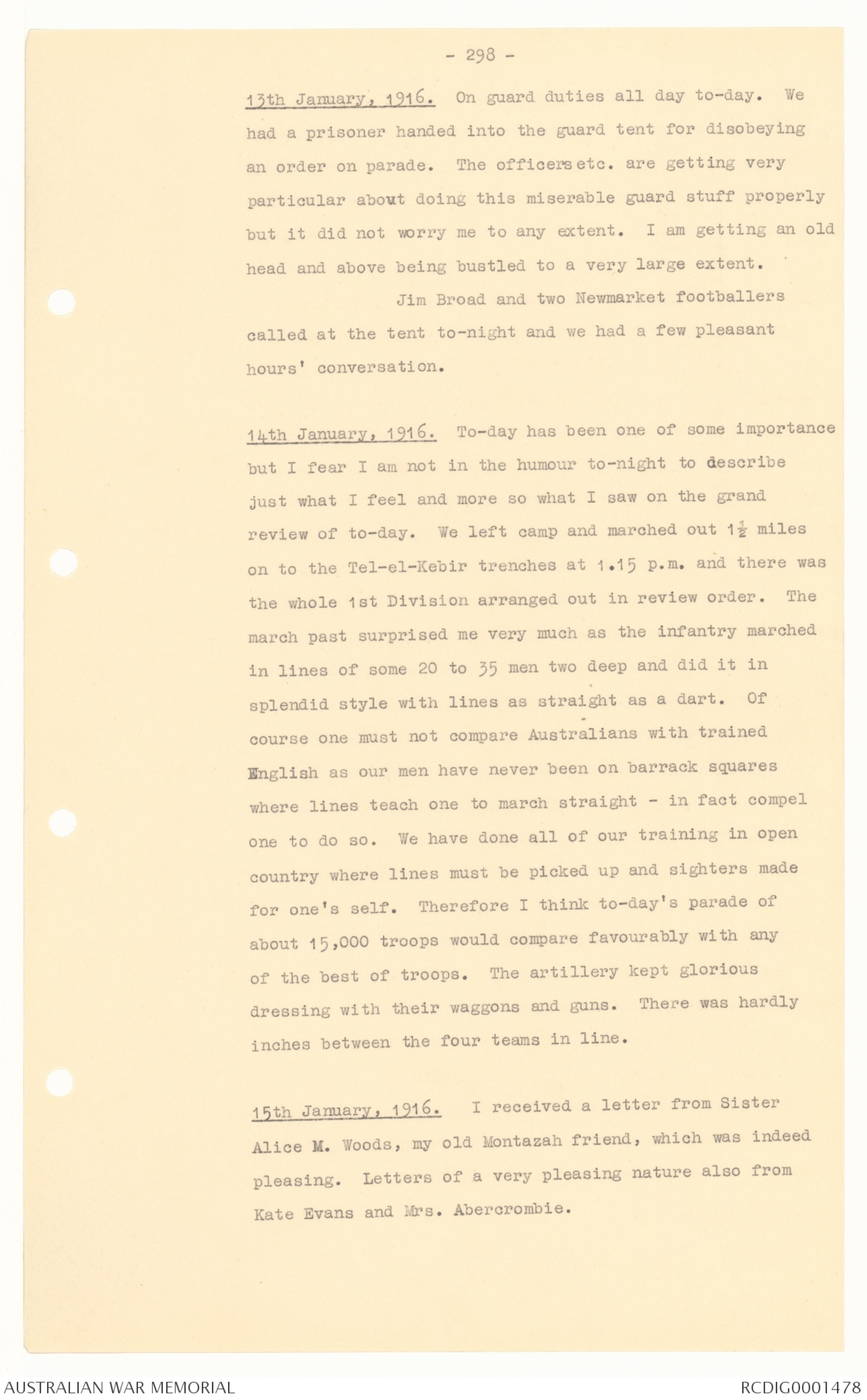
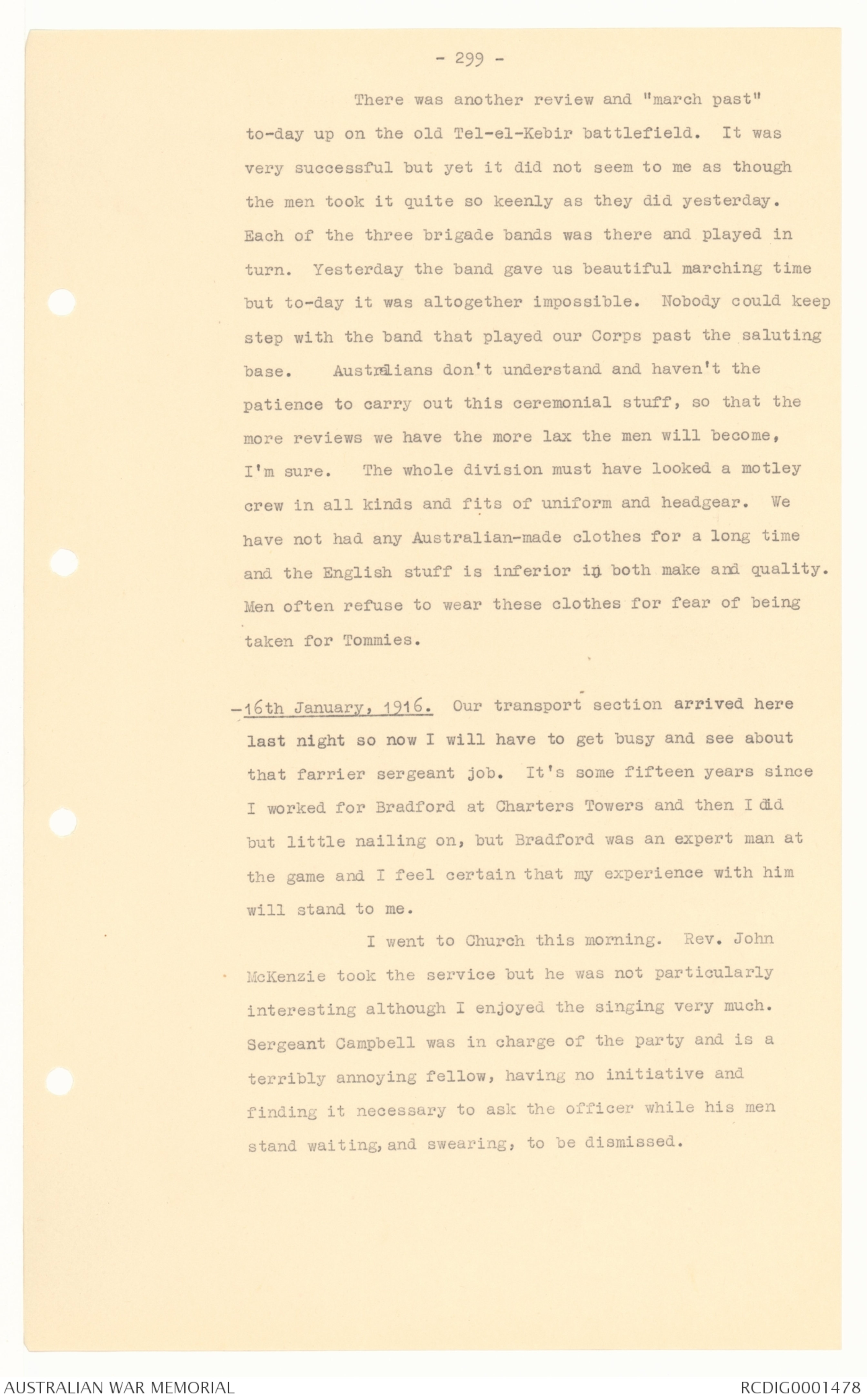
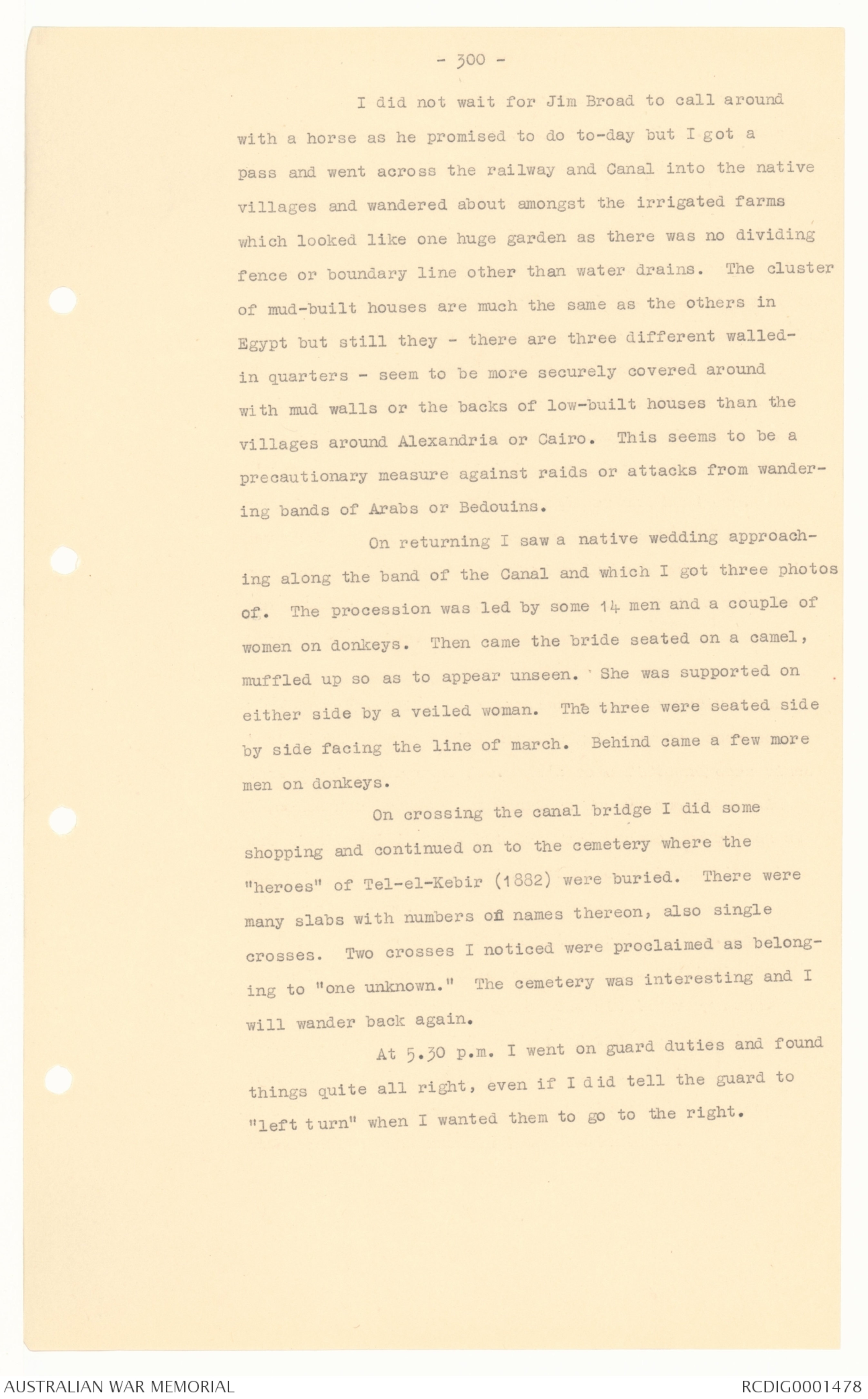
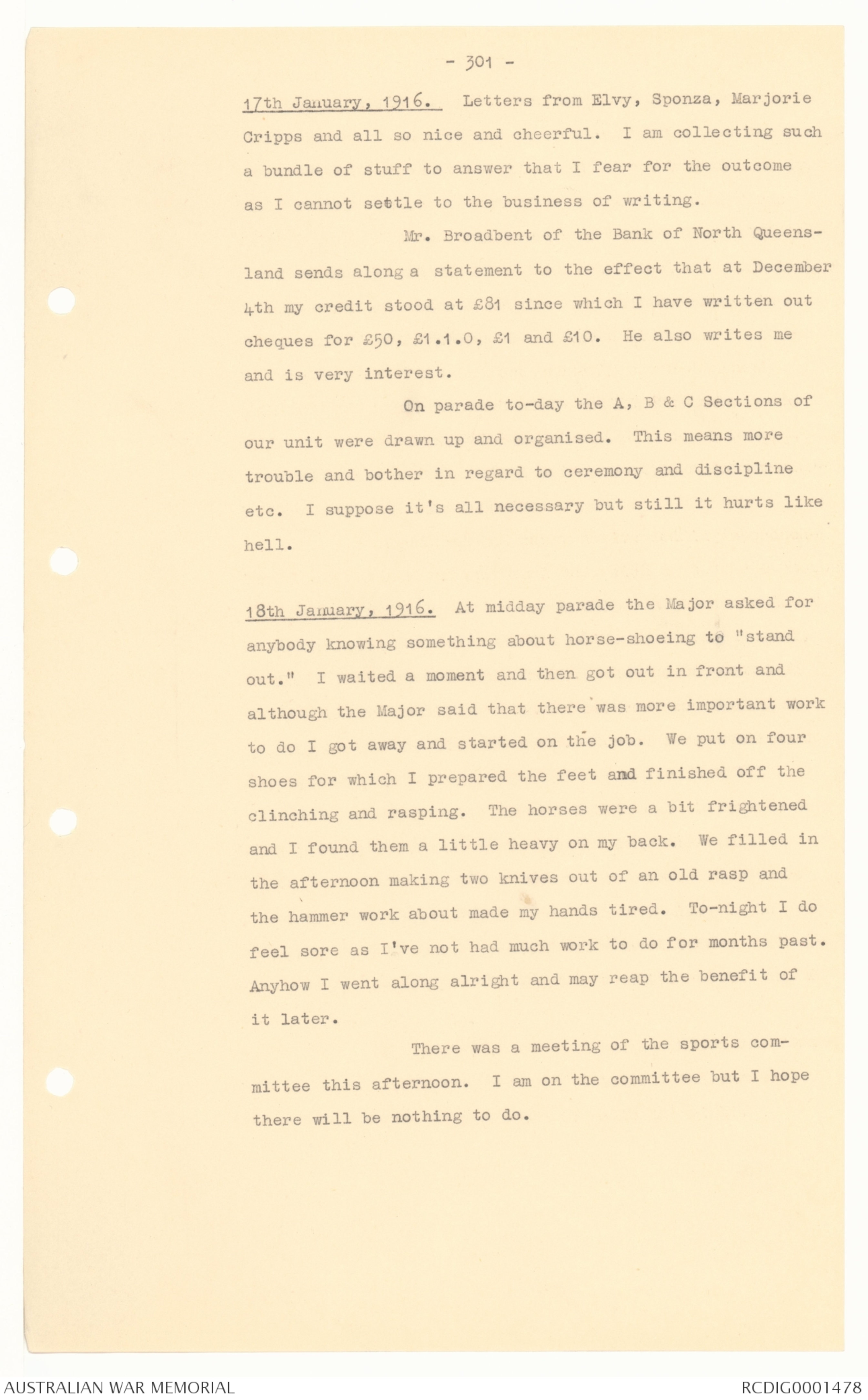
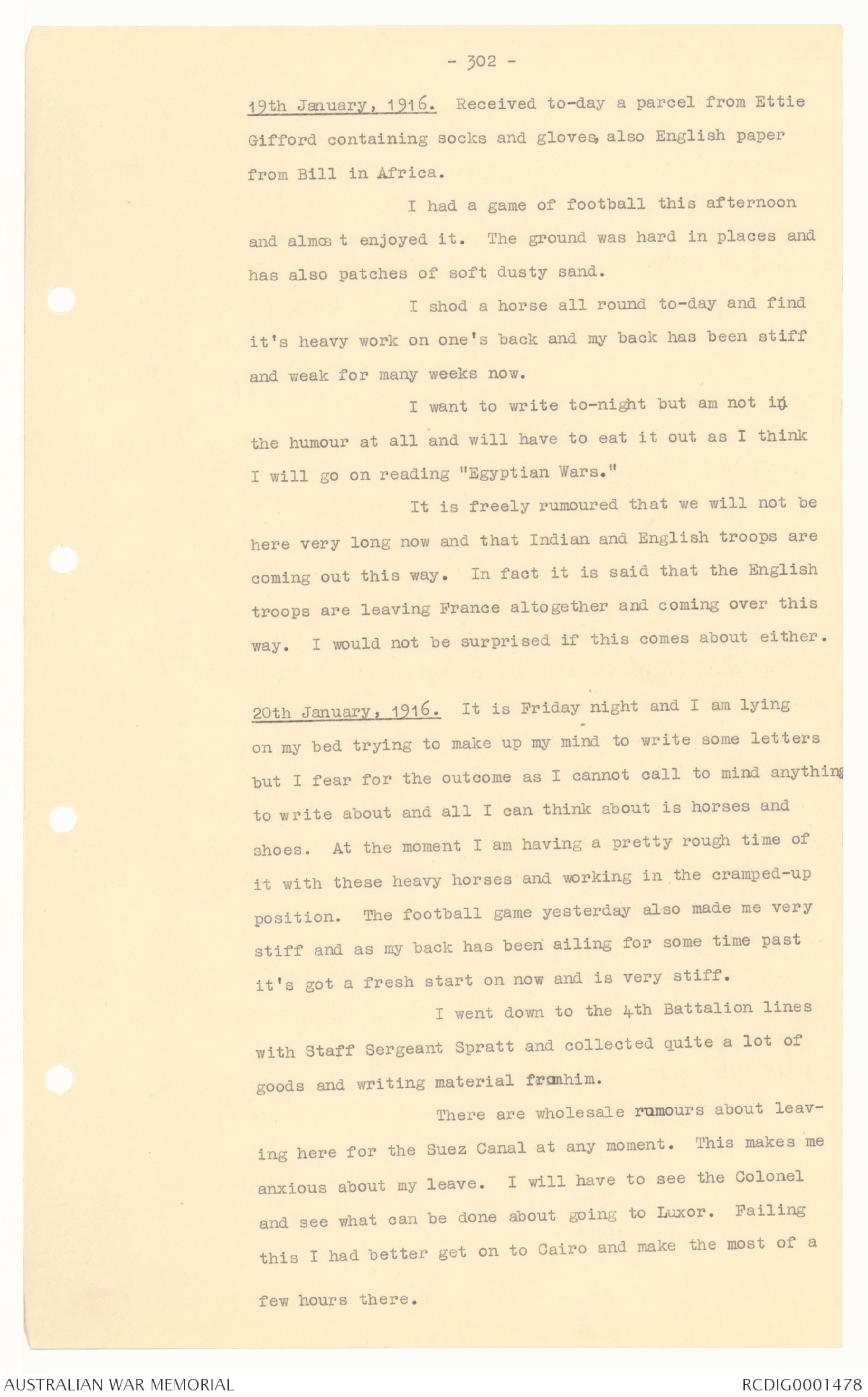
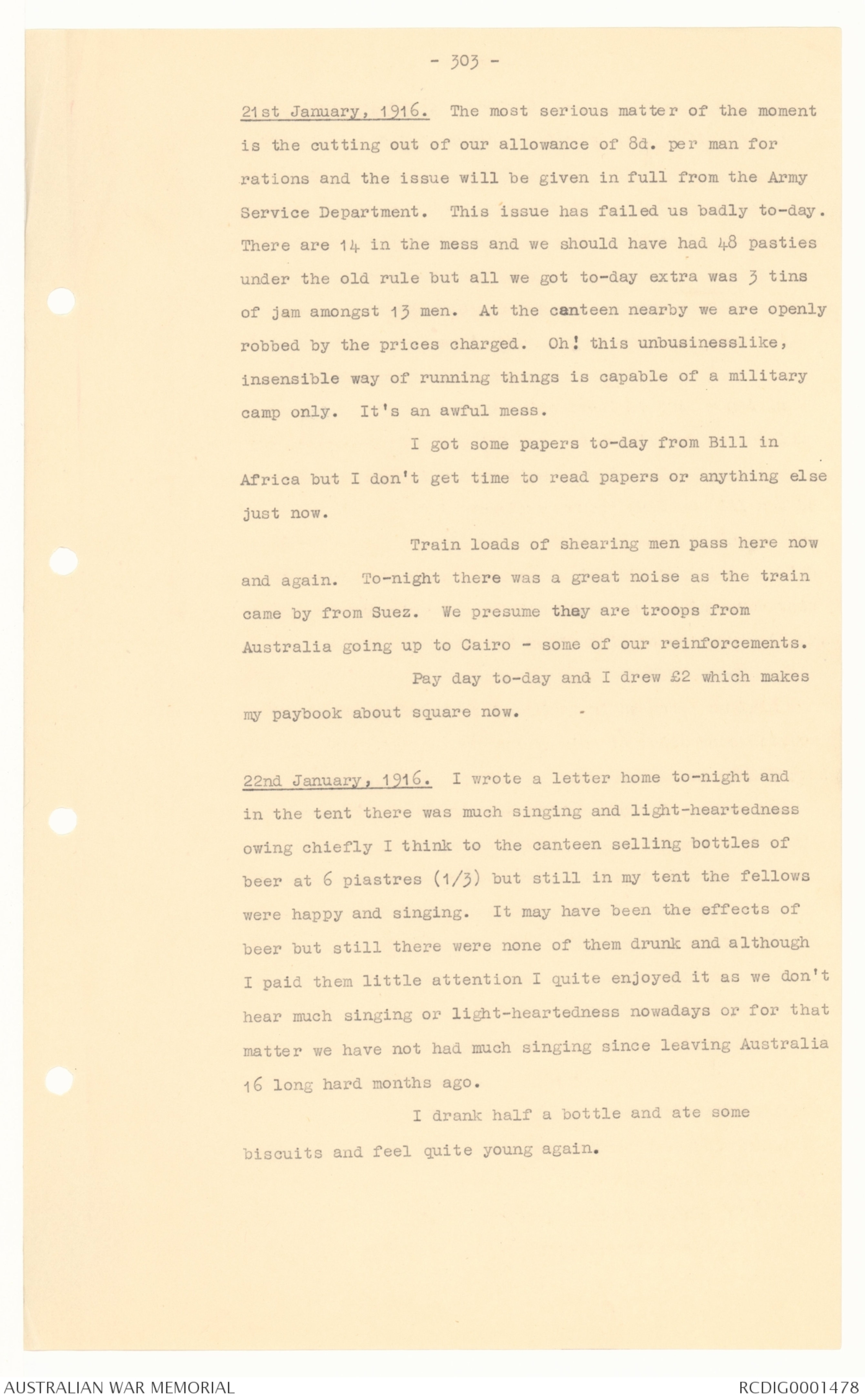
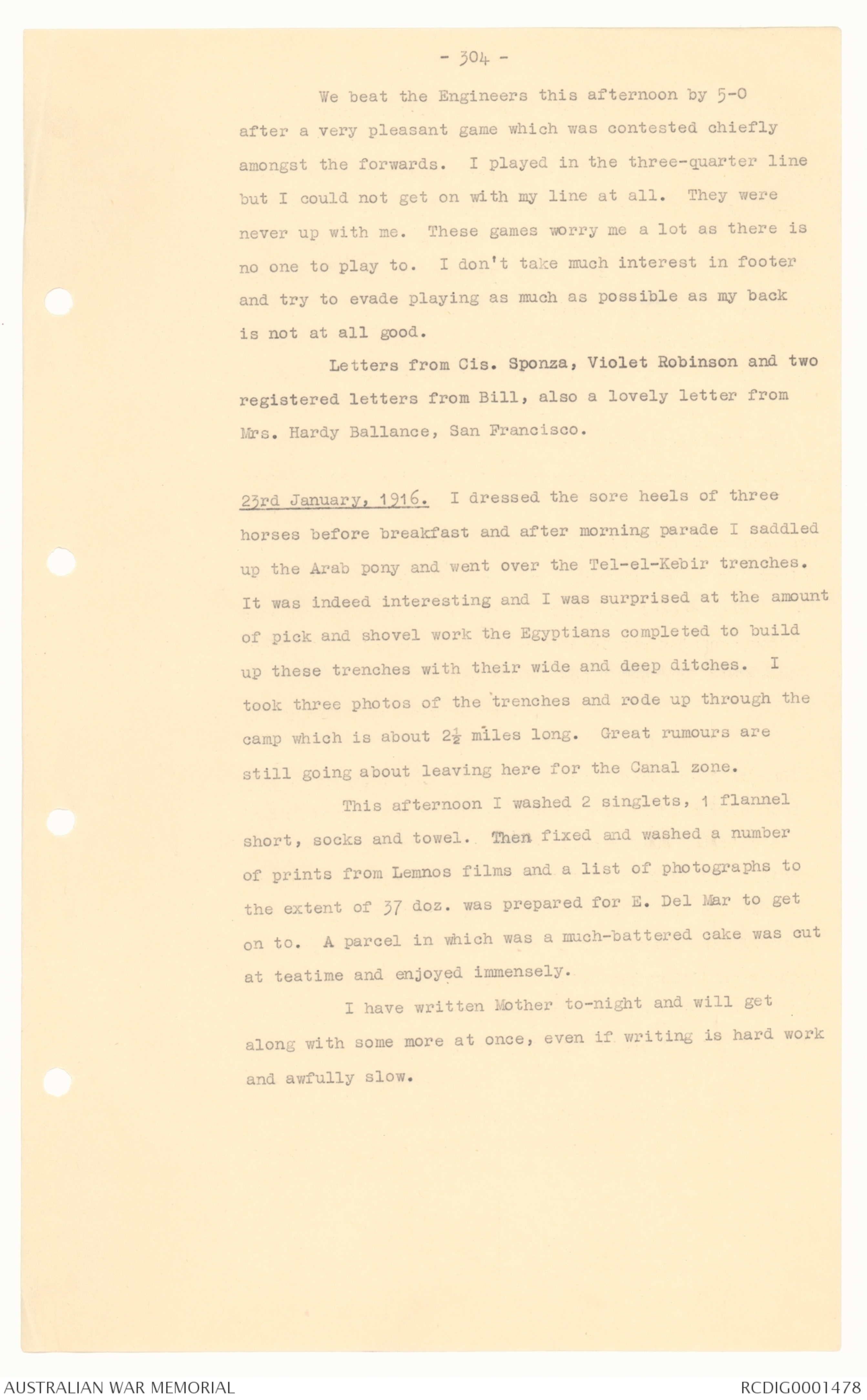
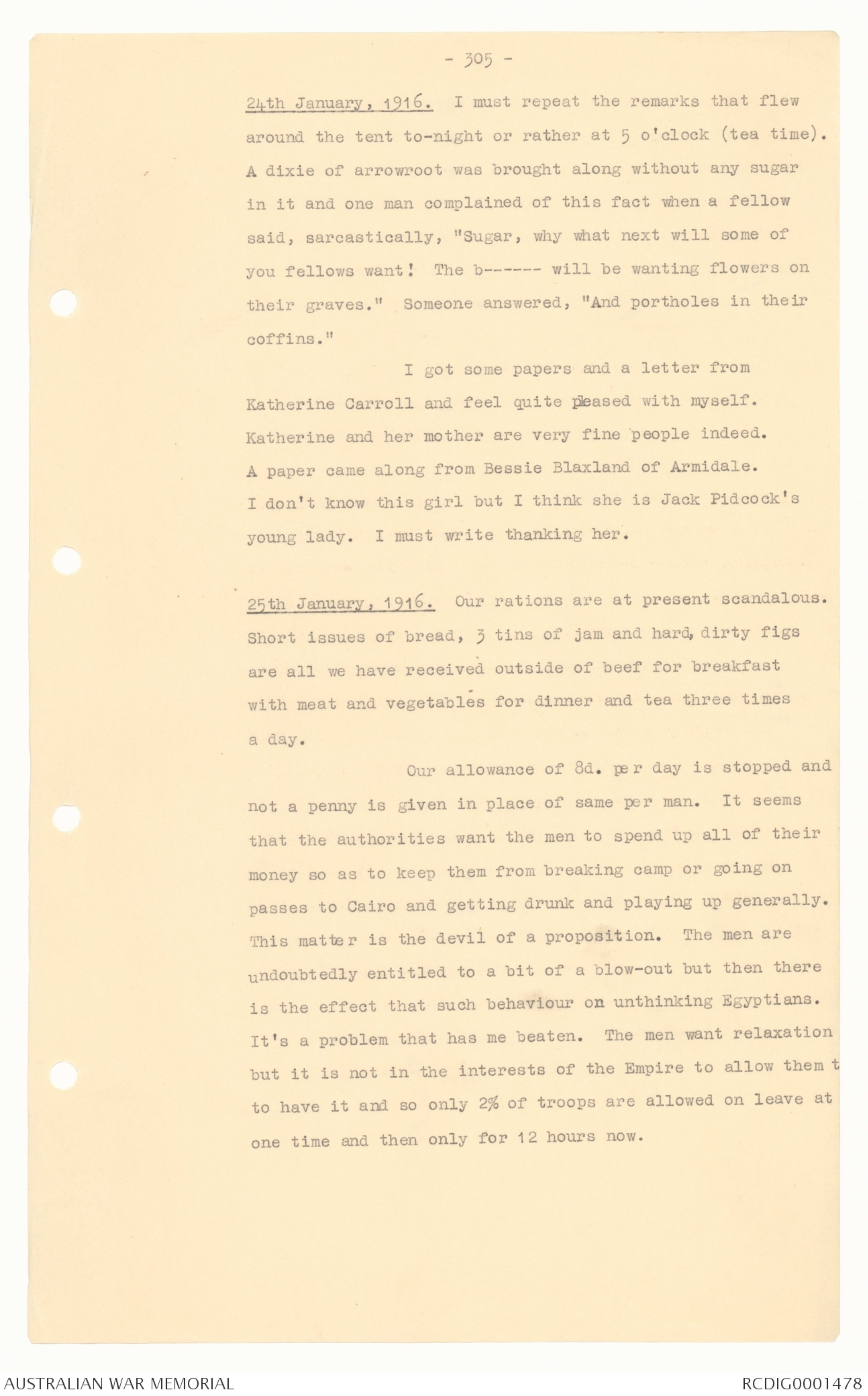
- 298 -
13th January, 1916. On guard duties all day to-day. We
had a prisoner handed into the guard tent for disobeying
an order on parade. The officers etc. are getting very
particular about doing this miserable guard stuff properly
but it did not worry me to any extent. I am getting an old
head and above being bustled to a very large extent.
Jim Broad and two Newmarket footballers
called at the tent to-night and we had a few pleasant
hours' conversation.
14th January, 1916. To-day has been one of some importance
but I fear I am not in the humour to-night to describe
just what I feel and more so what I saw on the grand
review of to-day. We left camp and marched out 1½ miles
on to the Tel-el-Kebir trenches at 1.15 p.m. and there was
the whole 1st Division arranged out in review order. The
march past surprised me very much as the infantry marched
in lines of some 20 to 35 men two deep and did it in
splendid style with lines as straight as a dart. Of
course one must not compare Australians with trained
English as our men have never been on barrack squares
where lines teach one to march straight - in fact compel
one to do so. We have done all of our training in open
country where lines must be picked up and sighters made
for one's self. Therefore I think to-day's parade of
about 15,000 troops would compare favourably with any
of the best of troops. The artillery kept glorious
dressing with their waggons and guns. There was hardly
inches between the four teams in line.
15th January, 1916. I received a letter from Sister
Alice M. Woods, my old Montazah friend, which was indeed
pleasing. Letters of a very pleasing nature also from
Kate Evans and Mrs. Abercrombie.
- 299 -
There was another review and "march past"
to-day up on the old Tel-el-Kebir battlefield. It was
very successful but yet it did not seem to me as though
the men took it quite so keenly as they did yesterday.
Each of the three brigade bands was there and played in
turn. Yesterday the band gave us beautiful marching time
but to-day it was altogether impossible. Nobody could keep
step with the band that played our Corps past the saluting
base. Australians don't understand and haven't the
patience to carry out this ceremonial stuff, so that the
more reviews we have the more lax the men will become,
I'm sure. The whole division must have looked a motley
crew in all kinds and fits of uniform and headgear. We
have not had any Australian-made clothes for a long time
and the English stuff is inferior in both make and quality.
Men often refuse to wear these clothes for fear of being
taken for Tommies.
-16th January, 1916. Our transport section arrived here
last night so now I will have to get busy and see about
that farrier sergeant job. It's some fifteen years since
I worked for Bradford at Charters Towers and then I did
but little nailing on, but Bradford was an expert man at
the game and I feel certain that my experience with him
will stand to me.
I went to Church this morning. Rev. John
McKenzie took the service but he was not particularly
interesting although I enjoyed the singing very much.
Sergeant Campbell was in charge of the party and is a
terribly annoying fellow, having no initiative and
finding it necessary to ask the officer while his men
stand waiting, and swearing, to be dismissed.
- 300 -
I did not wait for Jim Broad to call around
with a horse as he promised to do to-day but I got a
pass and went across the railway and Canal into the native
villages and wandered about amongst the irrigated farms
which looked like one huge garden as there was no dividing
fence or boundary line other than water drains. The cluster
of mud-built houses are much the same as the others in
Egypt but still they - there are three different walled-in
quarters - seem to be more securely covered around
with mud walls or the backs of low-built houses than the
villages around Alexandria or Cairo. This seems to be a
precautionary measure against raids or attacks from wandering
bands of Arabs or Bedouins.
On returning I saw a native wedding approaching
along the band of the Canal and which I got three photos
of. The procession was led by some 14 men and a couple of
women on donkeys. Then came the bride seated on a camel,
muffled up so as to appear unseen. She was supported on
either side by a veiled woman. The three were seated side
by side facing the line of march. Behind came a few more
men on donkeys.
On crossing the canal bridge I did some
shopping and continued on to the cemetery where the
"heroes" of Tel-el-Kebir (1882) were buried. There were
many slabs with numbers of names thereon, also single
crosses. Two crosses I noticed were proclaimed as belonging
to "one unknown." The cemetery was interesting and I
will wander back again.
At 5.30 p.m. I went on guard duties and found
things quite all right, even if I did tell the guard to
"left turn" when I wanted them to go to the right.
-301 -
17th January, 1916. Letters from Elvy, Sponza, Marjorie
Cripps and all so nice and cheerful. I am collecting such
a bundle of stuff to answer that I fear for the outcome
as I cannot settle to the business of writing.
Mr. Broadbent of the Bank of North Queensland
sends along a statement to the effect that at December
4th my credit stood at £81 since which I have written out
cheques for £50, £1.1.0, £1 and £10. He also writes me
and is very interest.
On parade to-day the A, B & C Sections of
our unit were drawn up and organised. This means more
trouble and bother in regard to ceremony and discipline
etc. I suppose it's all necessary but still it hurts like
hell.
18th January, 1916. At midday parade the Major asked for
anybody knowing something about horse-shoeing to "stand
out." I waited a moment and then got out in front and
although the Major said that there was more important work
to do I got away and started on the job. We put on four
shoes for which I prepared the feet and finished off the
clinching and rasping. The horses were a bit frightened
and I found them a little heavy on my back. We filled in
the afternoon making two knives out of an old rasp and
the hammer work about made my hands tired. To-night I do
feel sore as I've not had much work to do for months past.
Anyhow I went along alright and may reap the benefit of
it later.
There was a meeting of the sports committee
this afternoon. I am on the committee but I hope
there will be nothing to do.
-302-
19th January, 1916. Received to-day a parcel from Ettie
Gifford containing socks and gloves, also English paper
from Bill in Africa.
I had a game of football this afternoon
and almos t enjoyed it. The ground was hard in places and
has also patches of soft dusty sand.
I shod a horse all round to-day and find
it's heavy work on one's back and my back has been stiff
and weak for many weeks now.
I want to write to-night but am not in
the humour at all and will have to eat it out as I think
I will go on reading "Egyptian Wars."
It is freely rumoured that we will not be
here very long now and that Indian and English troops are
coming out this way. In fact it is said that the English
troops are leaving France altogether and coming over this
way. I would not be surprised if this comes about either.
20th January, 1916. It is Friday night and I am lying
on my bed trying to make up my mind to write some letters
but I fear for the outcome as I cannot call to mind anything
to write about and all I can think about is horses and
shoes. At the moment I am having a pretty rough time of
it with these heavy horses and working in the cramped-up
position. The football game yesterday also made me very
stiff and as my back has been ailing for some time past
it's got a fresh start on now and is very stiff.
I went down to the 4th Battalion lines
with Staff Sergeant Spratt and collected quite a lot of
goods and writing material fromhim.
There are wholesale rumours about leaving
here for the Suez Canal at any moment. This makes me
anxious about my leave. I will have to see the Colonel
and see what can be done about going to Luxor. Failing
this I had better get on to Cairo and make the most of a
few hours there.
- 303 -
21st January, 1916. The most serious matter of the moment
is the cutting out of our allowance of 8d. per man for
rations and the issue will be given in full from the Army
Service Department. This issue has failed us badly to-day.
There are 14 in the mess and we should have had 48 pasties
under the old rule but all we got to-day extra was 3 tins
of jam amongst 13 men. At the canteen nearby we are openly
robbed by the prices charged. Oh! this unbusinesslike,
insensible way of running things is capable of a military
camp only. It's an awful mess.
I got some papers to-day from Bill in
Africa but I don't get time to read papers or anything else
just now.
Train loads of shearing men pass here now
and again. To-night there was a great noise as the train
came by from Suez. We presume they are troops from
Australia going up to Cairo - some of our reinforcements.
Pay day to-day and I drew £2 which makes
my paybook about square now.
22nd January, 1916. I wrote a letter home to-night and
in the tent there was much singing and light-heartedness
owing chiefly I think to the canteen selling bottles of
beer at 6 piastres (1/3) but still in my tent the fellows
were happy and singing. It may have been the effects of
beer but still there were none of them drunk and although
I paid them little attention I quite enjoyed it as we don’t
hear much singing or light-heartedness nowadays or for that
matter we have not had much singing since leaving Australia
16 long hard months ago.
I drank half a bottle and ate some
biscuits and feel quite young again.
-304 -
We beat the Engineers this afternoon by 5-0
after a very pleasant game which was contested chiefly
amongst the forwards. I played in the three-quarter line
but I could not get on with my line at all. They were
never up with me. These games worry me a lot as there is
no one to play to. I don’t take much interest in footer
and try to evade playing as much as possible as my back
is not at all good.
Letters from Cis. Sponza, Violet Robinson and two
registered letters from Bill, also a lovely letter from
Mrs. Hardy Ballance, San Francisco.
23rd January, 1916. I dressed the sore heels of three
horses before breakfast and after morning parade I saddled
up the Arab pony and went over the Tel-el-Kebir trenches.
It was indeed interesting and I was surprised at the amount
of pick and shovel work the Egyptians completed to build
up these trenches with their wide and deep ditches. I
took three photos of the trenches and rode up through the
camp which is about 2½ miles long. Great rumours are
still going about leaving here for the Canal zone.
This afternoon I washed 2 singlets, 1 flannel
short, socks and towel. Then fixed and washed a number
of prints from Lemnos films and a list of photographs to
the extent of 37 doz. was prepared for E. Del Mar to get
on to. A parcel in which was a much-battered cake was cut
at teatime and enjoyed immensely.
I have written Mother to-night and will get
along with some more at once, even if writing is hard work
and awfully slow.
-305-
24th January, 1916. I must repeat the remarks that flew
around the tent to-night or rather at 5 o'clock (tea time).
A dixie of arrowroot was brought along without any sugar
in it and one man complained of this fact when a fellow
said, sarcastically, "Sugar, why what next will some of
you fellows want! The b------ will be wanting flowers on
their graves." Someone answered, "And portholes in their
coffins."
I got some papers and a letter from
Katherine Carroll and feel quite pleased with myself.
Katherine and her mother are very fine people indeed.
A paper came along from Bessie Blaxland of Armidale.
I don't know this girl but I think she is Jack Pidcock's
young lady. I must write thanking her.
25th January, 1916. Our rations are at present scandalous.
Short issues of bread, 3 tins of jam and hard, dirty figs
are all we have received outside of beef for breakfast
with meat and vegetables for dinner and tea three times
a day.
Our allowance of 8d. per day is stopped and
not a penny is given in place of same per man. It seems
that the authorities want the men to spend up all of their
money so as to keep them from breaking camp or going on
passes to Cairo and getting drunk and playing up generally.
This matter is the devil of a proposition. The men are
undoubtedly entitled to a bit of a blow-out but then there
is the effect that such behaviour on unthinking Egyptians.
It's a problem that has me beaten. The men want relaxation
but it is not in the interests of the Empire to allow them t
to have it and so only 2% of troops are allowed on leave at
one time and then only for 12 hours now.
 Sam scott
Sam scottThis transcription item is now locked to you for editing. To release the lock either Save your changes or Cancel.
This lock will be automatically released after 60 minutes of inactivity.